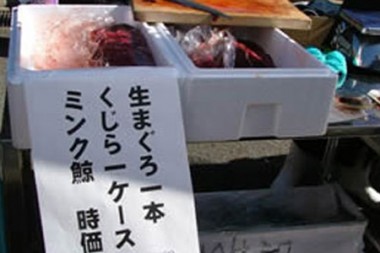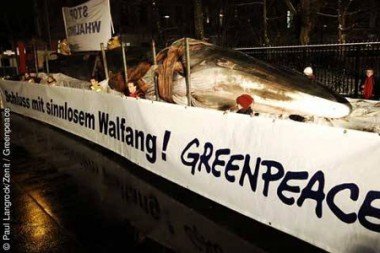Die einflussreichen DREI
Zwischen der japanischen Politik, Bürokratie und Wirtschaft besteht eine enge Beziehung.
Diese „Triade“ hält den japanischen Walfang aufrecht – nicht etwa kulturelle oder wissenschaftliche Interessen, wie uns von japanischen Botschaften und anderen Vertretern immer wieder weisgemacht wird.
Einen wichtigen Einfluss auf den Walfang üben auch ehemalige Bürokraten aus, die nun als Senior-Berater in der Wirtschaft tätig sind. Aber auch frühere Verantwortungsträger in den Ministerien. Wenn es darum geht, Interessensgruppen Subventionen zuzugestehen, so haben ehemalige Bürokraten und Politiker ein großes Mitspracherecht bei der Verteilung der Gelder.
Zu Japans „Walfang-Triade“ gehören im Einzelnen:
* das Ministerium für Landwirtschaft, Forstwesen und Fischerei MAFF (Ministry of Agriculture, Forestry and Fisheries),
* das Institut für Walforschung ICR (Institute of Cetacean Research) und
* der Fischereiverband JFA (Japan Fisheries Association).
Um es noch einmal klar zu stellen: Diese „Triade“ steht hinter Japans Walfang-Politik und nicht das öffentliche Interesse an der Fortführung einer Tradition sowie einer Esskultur!
Presse-Zensur
Das MAFF spricht sich für den Walfang aus und fördert den Walfleisch-Konsum. Negativschlagzeilen in der internationalen Presse werden vom Ministerium ignoriert und nicht veröffentlicht. So wurde zum Beispiel in der Walfang-Saison 2005/2006 in der japanischen Presse verschwiegen, dass 91 Prozent der gefangenen Wale trächtige Weibchen waren. Diese Meldung wäre bestimmt auch für viele Japaner vom moralischen Gesichtspunkt aus untragbar gewesen.
Japan ist auf den Import von Nahrungsmitteln angewiesen
40 Prozent der Nahrungsmittel in Japan stammen aus dem Meer. Doch schon längst kann sich Japan nicht mehr selbst versorgen. Von 113 Prozent (1964) ging die Selbstversorgungsrate 2006 auf 59 Prozent zurück. Japan ist also dringend auf den Import angewiesen. Das kann mit ein Grund dafür sein, dass die japanische Regierung den Verzehr von Walfleisch vorantreiben möchte.
Das Institut für Walforschung ICR
Bereits 1941 wurde in Japan Walforschung betrieben. 1947 wurde das ICR als Whale Research Institute (heute Institute of Cetacean Research) gegründet. 2005 gab das Fischereiministerium zwei Kriterien für die Walforschung vor:
* Durch den Verkauf von Walfleisch müssen die Expeditionskosten wieder ausgeglichen werden.
* Das Walforschungsprogramm soll langfristig ausgelegt sein mit dem Fernziel, den kommerziellen Walfang wieder aufzunehmen.
Diese Vorgaben sowie Abhängigkeiten zeigen einmal mehr, dass der Walschutz nicht zum Anliegen des ICR werden kann.
Die Subventionen, die das ICR vom Fischereiministerium erhält, sind sehr hoch. Von 2006 bis 2009 wurde ihm eine finanzielle Unterstützung von ca. 2,2 Milliarden Yen (ca. 20 Millionen Euro) zugesagt.
Das ICR ist außer vom Fischereiministerium auch noch von der Walfangflotte um Kyodo Shipping abhängig. Kyodos Schiffe sowie seine Besatzung werden vom ICR gechartert. Die etwa 300 Beschäftigten von Kyodo sind verantwortlich für den Walfang, die Fleischverarbeitung und den Fleischverkauf. Diese Beziehung zwischen Kyodo und dem ICR hält nun schon 20 Jahre lang.
Der Fischereiverband JFA
Die Japan Fisheries Association (JFA) wurde 1862 gegründet. Sie beherrscht die gesamte japanische Fischereiindustrie. 400 Mitglieder (Gesellschaften, Verbände, Einzelpersonen) zahlen zusammen einen jährlichen Mitgliedsbeitrag von 150 Millionen Yen (ca. 1.335.000 Euro) (Stand 2006/2007). Die JFA geht mit dem ICR konform, dass der kommerzielle Walfang wieder eingeführt werden soll.
Der Fischereiverband macht schon sehr lange seinen Einfluss in der japanischen Politik geltend. Dazu gehören u.a. private Vertragsabschlüsse mit anderen Ländern wie zum Beispiel 1965 das Handelsabkommen mit Korea. Man kann sagen, das Wort des Fischereiverbands wiegt genauso viel wie das Wort des Fischereiministeriums.
Als australische Umweltschützer 1989 bewirkten, dass die Jagd auf Thunfische um 66 Prozent gesenkt werden und eine Fangzone von 200 Meilen eingehalten werden musste, hatte dies große Auswirkungen auf die japanische Fischereiindustrie. Der JFA war der Meinung, dass die Beschlüsse von der australischen Regierung und nicht von Umweltverbänden erlassen worden waren, und protestierte deshalb beim australischen Premierminister gegen die Beschlüsse. Die japanische Regierung ließ diesen Protest widerwillig zu, um das Überleben der Fischereibranche zu sichern.
Nachdem 1987 von der IWC das Walfangmoratorium beschlossen wurde (siehe oben), veranlasste die JFA, dass das Fischereiministerium einen Fond für den wissenschaftlichen Walfang gründete. Im Oktober desselben Jahres wurde das noch heute tätige ICR (Institute of Cetacean Research) gegründet.
Dass ein ehemaliger Abgeordneter des Fischereiministeriums nun in der JFA das Sagen hat, zeigt deutlich, wie stark verwoben politische und wirtschaftliche Interessen sind.
Die JFA erhält jährlich 16 Milliarden Yens (= ungefähr 143 Millionen Euro) von der japanischen Regierung (2007-2008).



http://beachcarolina.com/2013/01/30/sea-shepherd-…
Sea Shepherd Needs Your Help To Save Whales & Help Captain Watson.
Conservation Group Launches Two White House Petitions; Has 30 Days to Collect 100,000 Signatures
The first petition is titled, “Take strong action to stop the Japanese from killing whales in the Southern Ocean Antarctic Whale Sanctuary” and can be found at :http://wh.gov/Vnbu. The full text of the petition language follows:
“The President must take swift and decisive action against Japan’s illegal whaling.
The second petition is titled, “Provide Safe Haven to Captain Paul Watson, Founder of Sea Shepherd Conservation Society” and can be found at: http://wh.gov/VnRf. The full text of the petition language follows:
By Mr.Michael “Beach Mick” Hudson is the founder and Editor of Beach Carolina Magazine.
Hier gibt es eine Mitmach-Möglichkeit, gegen den Verkauf von Walfleisch bei Yahoo zu protestieren:
http://www.eia-international.org/alert-update-tel…
Here you can protest against selling whale meat by yahoo:
http://www.eia-international.org/alert-update-tel…
[C]
The world knows the manipulation of information of the nuclear power plant disaster report. For a long time, the whale issue has been made into a taboo. Its best is done in order that Mr. O`barry and many people in the world may tell the Japanese truth. I am thankful to them from the bottom of my heart.
" Japan is the communism which was wearing the democratic mask. "
In order to stop whaling, we need the cooperation from the world.
We need your help to wake up !!
I send e-mail to the organization related to anti whaling, or many people. There, the person of two kinds of types exists.
Those who want to stop Japan's whaling truly . And the other, who merely tell the whaling tragedy in Japan.
This type of person has neither the wisdom of solution, nor a method. Only hopeless and a cruel photograph exist .
Which type is Dr.Midori Kagawa-Fox? I do not say here.
thank you.
Sincerely,
I can understand that you are disappointed, but I find it good that Midori Kagawa-Fox has explained with his treatise on the plight of whaling in Japan. Without education no solution is possible.
Ich kann verstehen, dass du enttäuscht bist, aber ich es finde es gut, dass Midori Kagawa-Fox mit ihrer Abhandlung über die Misere des Walfangs in Japan aufgeklärt hat. Ohne Aufklärung ist keine Lösung möglich.
Hi, Susanne
First, I appreciate having given the opportunity to post my opinion here and the place. That's right ! as your indication. " Without education no solution is possible." Who does the education? Is her essay published in Japanese? [ Published journal articles Kagawa-Fox, M. (2010), "The environmental ethics of Japan's Whaling", Asian Currents, no. 69 August, Asian Studies Association of Australia, E-bulletin, pp. 4-5.] Therefore, I indicated it as "the communism in which Japan was wearing the democratic mask." The truth of this taboo is brought about from overseas. It has social structure as which truth does not become known easily.However, it is hopeful. It is the Internet infrastructure. It is the pressure from EU,UK,AU,USA by the Internet.
Thank you ! Susanne. You should recognize that you are " the evangelist "whom God dispatched through the Internet.
Thank you, Toshio. But I'm not an evangelist but a woman who want to inform about dolphins (and whales) from all aspects.
I will continue to write to the Japanese ambassador in Germany and hope that the dolphin slaughter in Taiji soon will belong to the past.
Vielen Dank ! Liebe.
[B]
1) Since "triad"" which Dr.Midori Kagawa-Fox presented is firm, the anti-whaling people in Japan break the triangle how, or do not learn a method !
MAFF (Ministry of Agriculture, Forestry and Fisheries), the Institute of Cetacean Research ICR (Institute of Cetacean Research) and the Fisheries Association JFA (Japan Fisheries Association).
2) A whaling issue is very political.
Legislation ・ Administration ・ Administration of justice ・Media
These all protect whaling.
Manipulation of information of the media of Japan is carried out skillfully, and they do not tell people about truth.
*People cannot do the right judgment about whaling issue under this situation.
NO !!!!!! Dr.Midori Kagawa-Fox! please don't say so easily so "based on the national intention. Because people cast their vote and a man of power is chosen."
The Japanese branch of the world's largest environmental groups is very negative to a whaling issue. They have escaped from this issue. Who tells truth? Don't you tell the Japanese?
[A] http://www.meeresakrobaten.de/2012/11/in-japan-we…
( It continues from the comment of the upper site. )
Hi
I sent e-mail to Dr.Midori Kagawa-Fox.
Also fortunately, she sent a reply immediately.
However, I was disappointed very much about the contents.
* Answered by Dr.Midori Kagawa-Fox.
Q1;For what "party" should its vote be cast for a whaling stop?
A; I think that a whaling policy is continued even if its vote is cast by which party of Japan.
Q2;Is there "any anti-whaling politician" in Japan?
A; I think "NON".
Q3;Is there any swift attack means with which "whaling" is made to finish?
A; I think if based on the national intention. Because people cast their vote and a man of power is chosen.
It was a too much simple reply. And for the whale, there is no future and I became sad.
Hier eine kurze Zusammenfassung in Deutsch: Toshio Yashiro hat der Verfasserin der oben erwähnten Abhandlung geschrieben und gefragt, was man gegen den Walfang tun kann. Dr. Midori Kagawa-Fox ist überzeugt, dass der Walfang nur national beendet werden kann. Aber es gibt im Moment offenbar keine Partei, die sich gegen den Walfang einsetzt …